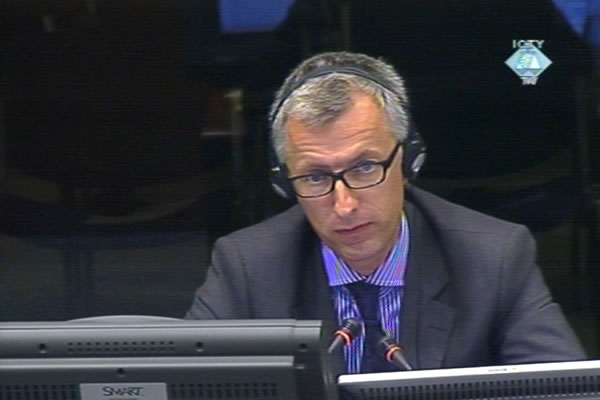Home
BOSNIAN SERB ‘GOALS OF WAR’
In the re-examination, the prosecution insisted that the Bosnian Serbs’ strategic goals were not just a ‘political platform’ for the negotiating table as Karadzic claimed. According to the prosecution, the goals were ‘made operational’ in the field. Karadzic’s trial continues on 16 August 2011, after the Tribunal’s summer recess
 Reynaud Theunens, witness at the Radovan Karadzic trial
Reynaud Theunens, witness at the Radovan Karadzic trial In the re-examination of military expert Reynaud Theunens, the prosecution insisted that the Bosnian Serbs’ strategic goals were ‘goals of war’ and not just ‘political goals’, as Radovan Karadzic argued in the cross-examination. The prosecution alleges that the minutes of the Bosnian Serb Assembly sessions during the war show this was the case, as do other documents that speak about their implementation.
At the 16th Assembly session in May 1992, Karadzic first presented the strategic goals. Miroslav Vjestica, a deputy from Bosanska Krupa, accepted the goals, provided that they were ‘made operational’. As Vjestica said, he was pleased to hear that one of the goals stated that the right bank of the Una river would be the western border of the Serb state.
The political decision to establish the border on the Una river was ‘made operational’ 13 days later, with a document sent in May 1992 from the War Presidency of Bosanska Krupa to the VRS 1st Krajina Brigade. The document speaks about the border on the Una river and the removal of Muslims from that part of Krajina.
According to the witness, those documents and other papers corroborate his conclusion that the strategic goals were a platform for the directives issued by the supreme command and the orders issued by the Main Staff to the VRS units, telling them what to do. At the same time, the strategic goals were used as a foundation for the political negotiations as ‘one [purpose] doesn’t rule out the other’, the witness explained.
Karadzic argued that the army was not aware of the strategic goals. The prosecutor quoted a speech Ratko Mladic gave at the 50th Assembly session on 16 April 1995. ‘The tasks of the army in the war have stemmed from the six strategic goals of the Bosnian Serbs adopted by our Assembly and they have not been fully implemented because of lack of financial and other support’, Mladic said.
The prosecution brought up the 53rd Assembly session on 28 August 1995, at which Karadzic spoke about the municipalities under the Serb control where the Serbs were not in the majority before the war. ‘Don’t speak of this, but remember how many of us lived in Bratunac, how many in Srebrenica, Rogatica, Vlasenica, Zvornik and so on’, Karadzic said. These towns ‘became ours because of their strategic importance and they are not an issue anymore’, Karadzic said.
According to the witness, those towns were of key importance for the implementation of the Bosnian Serbs’ strategic goals, particularly for the third goal, which called for the elimination of the border between the Serb states on the Drina river. This served to implement the first of the six strategic goals, the separation of the Serb people from other ethnic groups in BH.
Radovan Karadzic’s trial continues on Tuesday, 16 August 2011 after the Tribunal’s summer recess.
